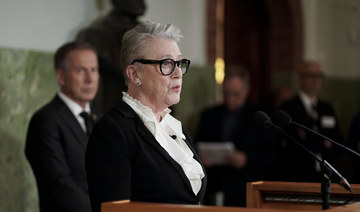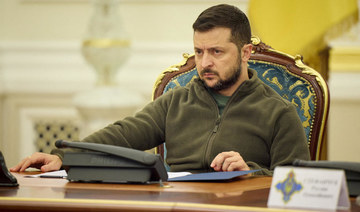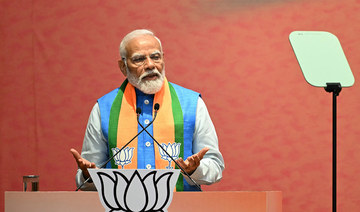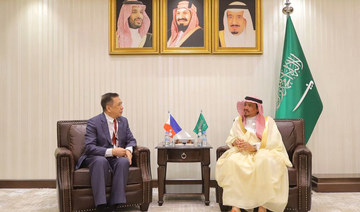GENEVA: The UN’s top human rights body voted Friday to appoint an independent expert to step up scrutiny of Russia’s rights record at home as arbitrary arrests, a crackdown on dissenting voices and limits on free speech worsen during the war in Ukraine.
The 47-member Human Rights Council passed the proposal, presented last week by all European Union member countries except Hungary, on a 17-6 vote, with 24 abstentions. Shortly before the vote in Geneva, Russian human rights group Memorial was named a co-winner of the 2022 Nobel Peace Prize.
The original proposal expressed concerns about “mass forced shutdowns” of independent media, non-governmental organizations and opposition groups in Russia.
The Human Rights Council majority agreed to name a “special rapporteur” to keep tabs on rights violations in Russia, in part by relying on help from Russian groups and activists who are both still in the country and abroad.
It’s the first time the council has authorized a special rapporteur to look into human rights issues in any of the five countries that are permanent members of the UN Security Council: Britain, China, France, Russia and the United States.
Russian ambassador Gennady Gatilov called the draft proposal a “despicable document” that was intended “to find yet another way of exerting leverage for bringing pressure to bear on Russia.”
“This scheme by the EU and its allies is yet another attempt to punish our country for pursuing an independent foreign and domestic policy, and to entrench for the long-term the topic of Russia on the agenda of the HRC so as to unleash a stream of false allegations and accusations directed at us,” Gatilov said.
Western countries provided most of the votes in favor, joined by Paraguay, Marshall Islands and Ukraine. Diplomats from Bolivia, China, Cuba, Eritrea, Kazakhstan and Venezuela voted against the proposal.
The number of abstentions in part reflected hesitations about authorizing a special rapporteur for a country that opposed the initiative: It’s unlikely that Russia will let the special rapporteur to visit the country.
The council previously appointed a Commission of Inquiry — the UN-backed body’s highest form of scrutiny — that is looking into rights abuses related to Russia’s war in Ukraine.
The Russian government has taken a number of steps to limit domestic dissent over the war, including passing a law that criminalizes spreading “fake” news about Russia’s military.
British ambassador Simon Manley said “repression at home, aggression abroad” by Russian authorities had increased since Russian forces invaded Ukraine in February.
“The truth is that (Russian) President (Vladimir) Putin uses repressive legislation to restrict freedom of speech and assembly. He crushes dissent through arbitrary detention and violence and has created a climate of fear and intimidation in order to deter civil society and activists from speaking out against the authorities,” Manley said.
Russia was a member of the Human Rights Council until earlier this year, when it suspended its participation as the UN General Assembly was set to strip the country of its membership due to the invasion of Ukraine.
Friday was the last day of the council’s fall session. A day earlier, member countries rejected a proposal, first floated by the United States and several other Western countries, to hold a debate over alleged human rights abuses in China’s Western Xinjiang region.
UN rights body agrees to appoint expert to scrutinize Russia
https://arab.news/58vup
UN rights body agrees to appoint expert to scrutinize Russia
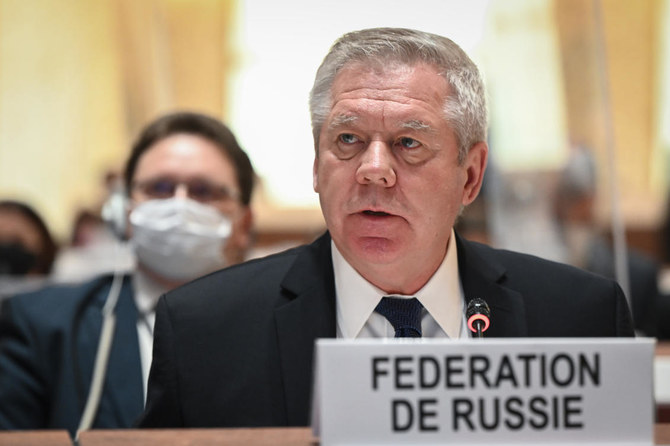
- The 47-member Human Rights Council passed the proposal, presented last week by all European Union member countries except Hungary
- The original proposal expressed concerns about “mass forced shutdowns" of independent media, NGOs and opposition groups in Russia
Biden signs ban on imports of Russian nuclear reactor fuel into law

- Russia is the world’s top supplier of enriched uranium, and about 24 percent of the enriched uranium used by US nuclear power plants come from the country
WASHINGTON: President Joe Biden signed a ban on Russian enriched uranium into law on Monday, the White House said, in the latest effort by Washington to disrupt President Vladimir Putin’s invasion of Ukraine.
The ban on imports of the fuel for nuclear power plants begins in about 90 days, although it allows the Department of Energy to issue waivers in case of supply concerns.
Russia is the world’s top supplier of enriched uranium, and about 24 percent of the enriched uranium used by US nuclear power plants come from the country.
The law also unlocks about $2.7 billion in funding in previous legislation to build out the US uranium fuel industry.
“Today, President Biden signed into law a historic series of actions that will strengthen our nation’s energy and economic security by reducing, and ultimately eliminating, our reliance on Russia for civilian nuclear power,” Jake Sullivan, the national security adviser, said in a statement.
Sullivan said the law “delivers on multilateral goals we have set with our allies and partners,” including a pledge last December with Canada, France, Japan and the United Kingdom to collectively invest $4.2 billion to expand enrichment and conversion capacity of uranium.
The waivers, if implemented by the Energy Department, allow all the Russian uranium imports the US normally imports through 2027.
Police aim to break up pro-Palestine protests in Amsterdam

- The Eindhoven University of Technology confirmed that there were “dozens of students peacefully protesting outside next to ten to 15 tents”
AMSTERDAM: Police moved in to end a pro-Palestinian protest at the University of Amsterdam on Monday after protesters occupied university buildings in various Dutch cities to condemn Israel’s war in Gaza, ANP news agency reported.
Earlier on Monday, a Dutch protest group said it had occupied university buildings in the Dutch cities of Amsterdam, Groningen and Eindhoven.
In a post on social media site X, Amsterdam police said the university had filed a police report against the protesters for acts of vandalism.
Police made sure no one entered the university buildings and asked protesters to leave the premises voluntarily.
A spokesperson for the University of Amsterdam confirmed the occupation and said it had advised people not affiliated with the protest to leave the building.
The Eindhoven University of Technology confirmed that there were “dozens of students peacefully protesting outside next to ten to 15 tents.”
Students in the Netherlands have been protesting against Israel’s war in Gaza since last Monday and Dutch riot police had previously clashed with protesters at the University of Amsterdam.
Students in the US and Europe have also been holding mostly peaceful demonstrations calling for an immediate permanent ceasefire and for schools to cut financial ties with companies they say are profiting from the oppression of Palestinians.
Ukraine’s first lady and foreign minister visit Russia-friendly Serbia

- Although Serbia has condemned the Russian aggression on Ukraine, it has refused to join international sanctions against Moscow
BELGRADE, Serbia: Ukrainian Foreign Minister Dmytro Kuleba made a surprise visit to Russia-friendly Serbia on Monday, together with Ukraine’s first lady, Olena Zelenska, in a sign of warming relations between the two states.
On his first visit to Serbia since the start of the Russian aggression on Ukraine in 2022, Kuleba met Serbian President Aleksandar Vucic and new Serbian Prime Minister Milos Vucevic, whose government includes several pro-Russian ministers, including two who have been under US sanctions.
A statement issued by the prime minister’s office after the talks said that “Serbia is committed to respecting international law and the territorial integrity of every member state of the United Nations, including Ukraine.”
Although Serbia has condemned the Russian aggression on Ukraine, it has refused to join international sanctions against Moscow and has instead maintained warm and friendly relations with its traditional Slavic ally.
Serbia has proclaimed neutrality regarding the war in Ukraine, and its authorities repeat that Serbia does not supply weapons to any parties. However, there are reports that Serbia has delivered weapons to Ukraine through intermediary countries. The visit by Kuleba and Zelenska, who toured the Serbian capital with Serbian first lady Tamara Vucic on Sunday, was met with criticism in Moscow. Comments by readers in the Russian state-run media such as “shameful” were published by RIA Novosti.
In what appears to be damage control, soon after his talks with Kuleba on Monday, Vucevic was to meet the Russian ambassador to Belgrade and the two were to tour a big storage facility for Russian gas that is being imported to Serbia.
Pro-Russian President Vucic has informally met Ukrainian President Volodymyr Zelenskyy three times on the sidelines of international conferences. Serbia has supplied Ukraine with humanitarian and financial aid.
Vucic has for years claimed to follow a “neutral” policy, balancing ties among Moscow, Beijing, Brussels and Washington. Although he has repeatedly said that Serbia is firm on its proclaimed goal of seeking European Union membership, under his authoritarian rule the Balkan country appears to be shifting closer to Russia and especially China.
During a high-stakes visit by Chinese President Xi Jinping to Belgrade last week, China and Serbia signed an agreement to build “ironclad” relations and a “shared joint future.”
Modi’s BJP skips Kashmir as Indian election enters fourth phase

- Millions of Indians across 96 constituencies began voting on Monday
- Ruling party is not fighting elections in Kashmir for first time in 30 years
NEW DELHI: India’s ruling Bharatiya Janata Party is not contesting elections in the Muslim-majority region of Kashmir for the first time in nearly three decades, as voting in the latest round of the national polls got underway on Monday.
The world’s most populous country began voting on April 19 in a seven-phase election that is scheduled to take place over six weeks, with ballots set to be counted on June 4.
India has 968 million people eligible to vote in the general election, where incumbent Prime Minister Narendra Modi and his Hindu nationalist BJP are aiming for a rare third consecutive term in power.
Monday’s voting involved 96 constituencies in the fourth round of polling.
While the BJP, which has been in power since 2014, and its allies are contesting every other part of India as they look to secure a majority of the 543 parliamentary seats, the party is sitting out in the northern Himalayan territory of Jammu and Kashmir.
This year marks the region’s first election since Modi’s government stripped the valley of its special autonomous status and statehood — which was granted by the Indian Constitution — on Aug. 5, 2019. The move unilaterally revoked the relevant provisions under Article 370, scrapping Kashmir’s flag, legislature, protections on land ownership and fundamental rights, sparking fears of demographic engineering in the region.
“It’s really surprising that the BJP, which claimed to have over 800,000 cadres in the valley, failed to find a single candidate. It shows that the BJP is not popular in the valley,” Sanjay Tickoo, the Srinagar-based leader of the Hindu minority group Kashmiri Pandit, told Arab News.
“I am expecting a record turnout to show the central government what (they) have done to the people of Jammu and Kashmir. This is the reflection of anger … no one is happy in the valley after the abrogation of Article 370.”
Indian-controlled Jammu and Kashmir is part of the larger Kashmiri territory, which has been the subject of international dispute since the 1947 partition of the Indian subcontinent into Hindu-majority India and Muslim-majority Pakistan. Both countries claim Kashmir in full and rule in part.
Modi said his government had been focusing on jobs and development as part of an effort to end violence in the valley, which has for decades witnessed outbreaks of separatist insurgencies to resist control from the government in New Delhi.
But after the BJP lost Kashmir’s three seats in the 2019 election, the party’s popularity slid further after it revoked the region’s autonomous status later the same year and subsequently imposed months of strict communication blockade and jailed hundreds of political leaders.
“The vote expresses not only anger but also apprehension against the anti-Muslim rants that have been going on as well as whatever they have done in Kashmir,” Professor Sheikh Showkat, a Srinagar-based political analyst, told Arab News.
Altaf Thakur, BJP spokesperson in Kashmir, said the party was still taking part in the Kashmir polls by supporting other regional parties.
“It is not correct to say that we are not fighting the election, we are playing the role of kingmaker and whichever way the cadres of the BJP will go, we will win,” he told Arab News.
“It’s not important whether we stand in the elections or not, the important thing is that we have to defeat the dynasty rulers,” he said, referring to the main contenders in the Kashmir polls, the National Conference and People’s Democratic Party.
While they are fighting each other in the valley, both parties have said they oppose the BJP and are part of the Congress party-led opposition alliance, known as India.
For some Kashmiri voters, Monday’s vote was about speaking up for themselves.
“The BJP knew that they cannot tolerate the wrath of the people of Kashmir. They fled the contest without a fight,” Aijaz Ahmed, a businessman from Srinagar, told Arab News.
“I voted today because it gave me an opportunity to express myself and tell the government in Delhi that you cannot keep us silenced. We want an atmosphere without fear and a region where our own identity is not questioned.”
5,000 Filipino pilgrims expected to fly to Makkah for Hajj

- Travelers ‘can expect VIP-like treatment,’ National Commission on Muslim Filipinos says
- First pilgrims will take off from Manila International Airport next week
MANILA: Thousands of Filipino pilgrims are set to travel to Makkah for the upcoming Hajj pilgrimage, the National Commission on Muslim Filipinos said on Monday, with the first batch set to leave for Saudi Arabia next week.
In the predominantly Catholic Philippines, Muslims constitute about 10 percent of the nearly 120 million population. Most live on the island of Mindanao and the Sulu archipelago in the country’s south, as well as in the central-western province of Palawan.
The commission said that nearly 5,000 Muslims had confirmed they would travel to Saudi Arabia to perform the Hajj pilgrimage this year.
“We have already processed 96 percent of the pilgrims,” Zainoden Usudan, chief of Hajj operations at the NCMF’s Bureau of Pilgrimage and Endowment, said.
“They can expect VIP-like treatment, allowing them to fully concentrate on their pilgrimage.”
Officials from the commission have been working hard to ensure that the difficulties faced by pilgrims last year will not be a problem this time around.
“This time, we are making sure that food will not be a problem,” Usudan said, referring to problems with delayed meal deliveries in 2023.
He said the commission was working with a service provider in the Kingdom that had contingency plans for all aspects of the trip, including transportation.
The first Hajj flight from the Philippines is set to take off from Manila International Airport on May 23.
One of the five pillars of Islam, this year’s Hajj is expected to run from June 14-19. Many pilgrims extend their stays to make the most of the once-in-a-lifetime opportunity to fulfill their religious duty.



